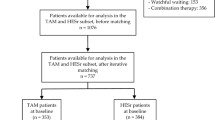Abstract
In this review the authors consider the commercially available herbal product PC-SPES. This is a combination of eight different herbs marketed for its effects of reducing prostate specific antigen (PSA) levels, improving pain, and enhancing the quality of life of those with hormone refractory prostate cancer. The evidence for these claims does not appear to be as conclusive as reported by the manufactures of this product. There also appears to be a significant risk of deep vein thrombosis (DVT) in those treated with PC-SPES. There have been 116 clinical and laboratory based studies of PC-SPES published to date, but there have been no randomised controlled trials conducted. Many of these studies contain very few patients, thus making the drawing of conclusions difficult. Despite this lack of information, there still remains a large patient group taking this supplement, therefore caution should be advised in the usage of PC-SPES in the treatment of hormone refractory prostate cancer.
This is a preview of subscription content, access via your institution
Access options
Subscribe to this journal
Receive 4 print issues and online access
$259.00 per year
only $64.75 per issue
Buy this article
- Purchase on Springer Link
- Instant access to full article PDF
Prices may be subject to local taxes which are calculated during checkout
Similar content being viewed by others
References
Landis SH et al.. Cancer statistics 1999. CA Cancer J Clin 1999 49: 6–29.
Klein LA. . Prostatic carcinoma. New Engl J Med 1979 300: 824–833.
Parker SL et al.. Cancer statistics 1997. CA Cancer J Clin 1997 47: 5–27.
Ross RK, Henderson BE. . Do diet and androgens alter prostate cancer risk via a common aetiologic pathway? J Natl Cancer Inst 1994 86: 252–254.
Eisenberg DM et al.. Unconventional medicine in the United States. Prevalence, costs and patterns of use. New Engl J Med 1993 328: 246–252.
Carraro JC et al.. Comparison of phytotherapy with finasteride in the treatment of benign prostatic hyperplasia: a randomised international study of 1098 patients. Prostate 1996 29: 231–240.
Volz HP. . Controlled clinical trials of hypericum extracts in depressed patients—an overview. Pharmacopsychiatry 1997 30: Suppl 2 72–76.
Halicka HD et al.. Apoptosis and cell cycle effects induced by extracts of the Chinese herbal preparation PC-SPES. Int J Oncol 1997 11: 437–441.
Kellis JT, Vickery LE. . Inhibition of human oestrogen synthetase (aromatase) by flavones. Science 1984 225: 1032–1034.
Agarwal R, Wang ZY, Mukhtar H. . Inhibition of mouse skin tumour initiating activity of DMBA by chronic oral feeding of glycyrrhizin in drinking water. Nutr Cancer 1991 15: 187–193.
Smith RE, Donachie AM, Mowat AM. . Immune stimulating complexes as mucosal vaccines. Immunol Cell Biol 1998 76: 263–269.
Wang SY et al.. The anti tumour effect of Ganoderma lucidum is mediated by cytokines released from activated macrophages and T-lymphocytes. Int J Cancer 1997 70: 699–705.
Wilt TJ et al.. Saw palmetto extracts for treatment of benign prostatic hyperplasia: a systematic review. JAMA 1998 280: 1604–1609.
Nagao Y et al.. Antitumour activity of Rabdosia and Teucrium diterpenoids against P 338 lymphocytic leukaemia in mice. Chem Pharm Bull (Tokyo) 1982 30: 727–729.
Small EJ et al.. Prospective trial of the herbal supplement PC-SPES in patients with progressive prostate cancer. J Clin Oncol 2000 18: 3595–3603.
De la Teille A et al.. Effects of a phytherapeutic agent, PC-SPES, on prostate cancer: a preliminary investigation on human cell lines and patients. BJU Int 1999 84: 845–850.
De la Teille A et al.. Herbal therapy PC-SPES: in vitro effects and evaluation of its efficacy in 69 patients with prostate cancer. J Urol 2000 164: 1229–1234.
Pfeifer BL, Pirani JF, Hamann SR, Klippel KF. . PC-SPES, a dietary supplement for the treatment of refractory prostate cancer. BJU Int 2000 85: 481–485.
DiPaola RS et al.. Clinical and biologic activity of an oestrogenic herbal combination (PC-SPES) in prostate cancer. New Engl J Med 1998 339: 785–791.
Heish T, Chen S, Wang X, Wu J. . Regulation of androgen receptor and prostate specific antigen expression in the androgen responsive human prostate LNCaP cells by ethanolic extracts of the Chinese herbal preparation, PC-SPES. Biochem Mol Biol Int 1997 42: 535–539.
Heish T et al.. Induction of apoptosis and down regulation of bcl-6 in Mutu I cells treated with ethanolic extracts of the Chinese herbal supplement PC-SPES. Int J Oncol 1998 13: 1199–1203.
Author information
Authors and Affiliations
Corresponding author
Rights and permissions
About this article
Cite this article
Meyer, JP., Gillatt, D. PC-SPES: a herbal therapy for the treatment of hormone refractory prostate cancer. Prostate Cancer Prostatic Dis 5, 13–15 (2002). https://doi.org/10.1038/sj.pcan.4500563
Received:
Revised:
Accepted:
Published:
Issue Date:
DOI: https://doi.org/10.1038/sj.pcan.4500563
Keywords
This article is cited by
-
Safety Surveillance of Traditional Chinese Medicine: Current and Future
Drug Safety (2015)
-
Upregulation of death receptor 5 and activation of caspase 8/3 play a critical role in ergosterol peroxide induced apoptosis in DU 145 prostate cancer cells
Cancer Cell International (2014)
-
Complementary medicine use by men with prostate cancer: a systematic review of prevalence studies
Prostate Cancer and Prostatic Diseases (2011)
-
Anticancer activity of extracts derived from the mature roots of Scutellaria baicalensis on human malignant brain tumor cells
BMC Complementary and Alternative Medicine (2006)



